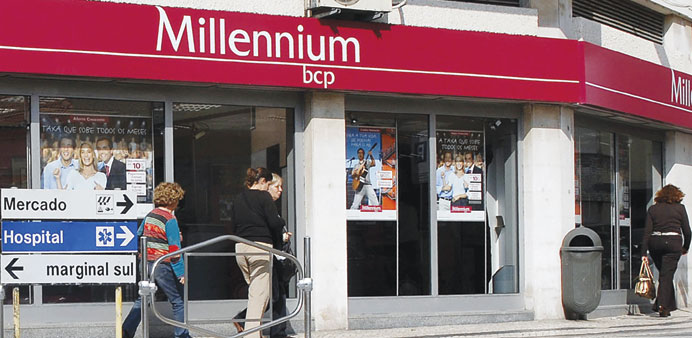Pedestrians walk past a branch of Banco Comercial Portugues in Peniche, Portugal. Lenders in Italy, Portugal and Spain were among the biggest decliners after Greece imposed capital controls, led by Banco Comercial Portugues, which tumbled 11%.
Bloomberg/London
European banks slumped the most since 2011, erasing almost €60bn($67bn) in market value, after Greece imposed capital controls and shut lenders.
The Stoxx 600 Banks Index fell as much as 4.4%, the biggest decline since November 2011. The gauge closed down 4%, eliminating most of last week’s rally. Lenders in Italy, Portugal and Spain were among the biggest decliners, led by Banco Comercial Portugues, which tumbled 11%.
Greece shut its banks and imposed capital controls to help avert the collapse of its financial system amid increasing concerns it will be forced out of the euro area. Banks will be closed at least until July 6, the day after Greeks vote in a referendum on proposals to restore bailout aid.
“We are witnessing the maximum level of concern about Greece today,” said Dominic Rossi, global chief investment officer of equities at Fidelity Worldwide Investment, which oversees about $284.7bn in assets.
The European Central Bank froze the ceiling on Emergency Liquidity Assistance to Greek lenders at just below €89bn, refusing for the first time this year to maintain a buffer as deposits decreased.
Greece is the second euro-area country after Cyprus to impose capital controls.
Spain’s Banco Popular Espanol fell 7.2% and Banco de Sabadell decreased 5.2%. Italy’s Banca Monte dei Paschi di Siena declined 10%, while Intesa Sanpaolo dropped 6.1% and Banca Popolare di Milano Scarl fell 7.9%.
The prospect of a euro-area exit has returned “swiftly to the market calculus,” said Mark Burgess, who helps oversee about £341bn ($538bn) as chief investment officer for Columbia Threadneedle Investments in Europe.
“It is hard to see how uncertainty diminishes in the near term.”
Greek bank bonds dropped to the lowest levels on record, with notes sold by Alpha Bank AE and Piraeus Bank falling by about 35 percentage points to less than 43% of face value. A measure of financial debt risk across Europe surged by the most since the collapse of Lehman Brothers Holdings.
The costs of insuring bank bonds in Europe from default rose, with the Markit iTraxx Europe Senior Financial Index of credit-default swaps on 30 European banks and insurers increasing by as much as 28% to 98 basis points, the biggest increase since September 2008, before falling back to 91 as of 5pm in London.
While the risk of contagion has eased since Greece triggered a sovereign debt crisis in 2009, when foreign banks had larger direct exposures to the country, lenders remain vulnerable to the threat of a euro breakup. Some also face swings in prices on their sovereign holdings.
Italian banks’ stock of their country’s sovereign debt stood at almost a record high of €415.5bn in April, Bank of Italy data show.
“The main impact on banks will be on their investment portfolios,” Antonio Guglielmi, a London-based analyst at Mediobanca, wrote in a note yesterday. Banks in the rest of Europe will also be affected through fixed-income trading, with Deutsche Bank AG and BNP Paribas SA among the largest bond traders exposed to losses, he wrote.
European banks’ exposure to Greece is at about $45bn, Bank of America Corp said in a note dated June 19. HSBC Holdings and Credit Agricole had the greatest exposure to Greece at the end of 2014, at €5bn and about €4.2bn respectively, according to Berenberg.
Greece leaving the euro region would be a “blip” for British banks, said Scott Vincent, managing partner of consulting firm Parker Fitzgerald.
“The exposure to Greece is absolutely minimal,” Vincent said. “The banking sector is well prepared for” Greece defaulting or leaving the currency region, he added.

